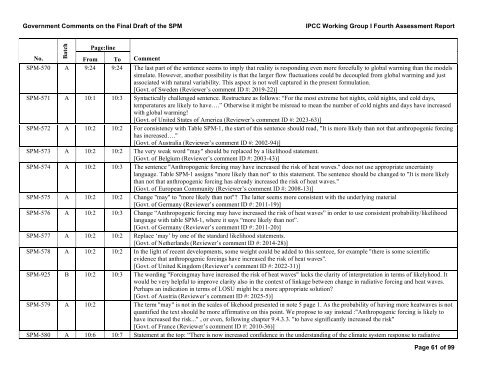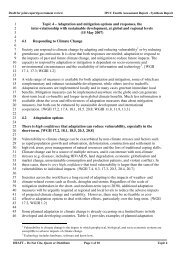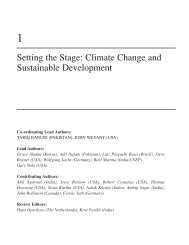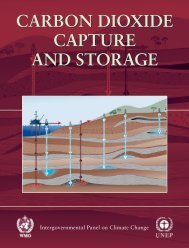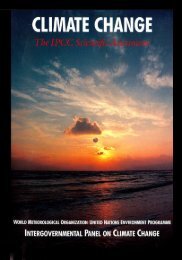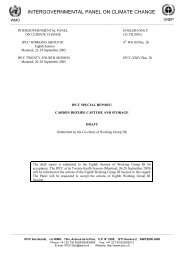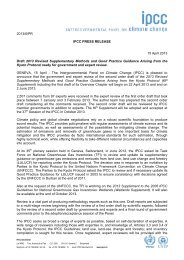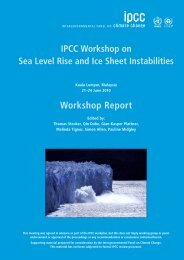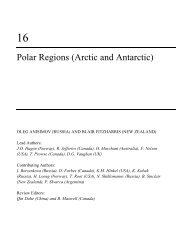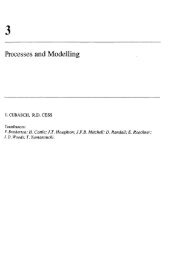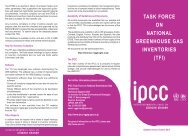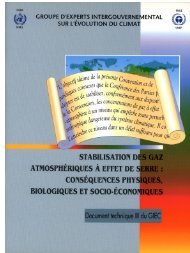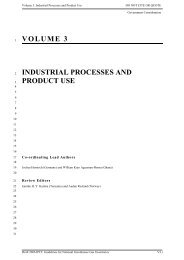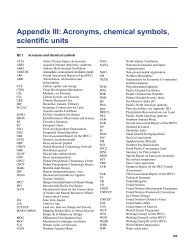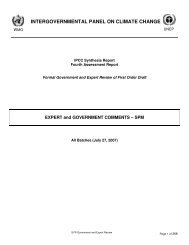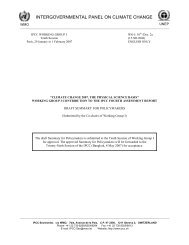Government Comments on the Final Draft of the SPM IPCC Working ...
Government Comments on the Final Draft of the SPM IPCC Working ...
Government Comments on the Final Draft of the SPM IPCC Working ...
Create successful ePaper yourself
Turn your PDF publications into a flip-book with our unique Google optimized e-Paper software.
<str<strong>on</strong>g>Government</str<strong>on</strong>g> <str<strong>on</strong>g>Comments</str<strong>on</strong>g> <strong>on</strong> <strong>the</strong> <strong>Final</strong> <strong>Draft</strong> <strong>of</strong> <strong>the</strong> <strong>SPM</strong><br />
<strong>IPCC</strong> <strong>Working</strong> Group I Fourth Assessment Report<br />
Batch<br />
Page:line<br />
No.<br />
From To Comment<br />
<strong>SPM</strong>-570 A 9:24 9:24 The last part <strong>of</strong> <strong>the</strong> sentence seems to imply that reality is resp<strong>on</strong>ding even more forcefully to global warming than <strong>the</strong> models<br />
simulate. However, ano<strong>the</strong>r possibility is that <strong>the</strong> larger flow fluctuati<strong>on</strong>s could be decoupled from global warming and just<br />
associated with natural variability. This aspect is not well captured in <strong>the</strong> present formulati<strong>on</strong>.<br />
[Govt. <strong>of</strong> Sweden (Reviewer’s comment ID #: 2019-22)]<br />
<strong>SPM</strong>-571 A 10:1 10:3 Syntactically challenged sentence. Restructure as follows: “For <strong>the</strong> most extreme hot nights, cold nights, and cold days,<br />
temperatures are likely to have….” O<strong>the</strong>rwise it might be misread to mean <strong>the</strong> number <strong>of</strong> cold nights and days have increased<br />
with global warming!<br />
[Govt. <strong>of</strong> United States <strong>of</strong> America (Reviewer’s comment ID #: 2023-63)]<br />
<strong>SPM</strong>-572 A 10:2 10:2 For c<strong>on</strong>sistency with Table <strong>SPM</strong>-1, <strong>the</strong> start <strong>of</strong> this sentence should read, "It is more likely than not that anthropogenic forcing<br />
has increased…."<br />
[Govt. <strong>of</strong> Australia (Reviewer’s comment ID #: 2002-94)]<br />
<strong>SPM</strong>-573 A 10:2 10:2 The very weak word "may" should be replaced by a likelihood statement.<br />
[Govt. <strong>of</strong> Belgium (Reviewer’s comment ID #: 2003-43)]<br />
<strong>SPM</strong>-574 A 10:2 10:3 The sentence "Anthropogenic forcing may have increased <strong>the</strong> risk <strong>of</strong> heat waves." does not use appropriate uncertainty<br />
language. Table <strong>SPM</strong>-1 assigns "more likely than not" to this statement. The sentence should be changed to "It is more likely<br />
than not that anthropogenic forcing has already increased <strong>the</strong> risk <strong>of</strong> heat waves."<br />
[Govt. <strong>of</strong> European Community (Reviewer’s comment ID #: 2008-13)]<br />
<strong>SPM</strong>-575 A 10:2 10:2 Change "may" to "more likely than not"? The latter seems more c<strong>on</strong>sistent with <strong>the</strong> underlying material<br />
[Govt. <strong>of</strong> Germany (Reviewer’s comment ID #: 2011-19)]<br />
<strong>SPM</strong>-576 A 10:2 10:3 Change “Anthropogenic forcing may have increased <strong>the</strong> risk <strong>of</strong> heat waves” in order to use c<strong>on</strong>sistent probability/likelihood<br />
language with table <strong>SPM</strong>-1, where it says “more likely than not”.<br />
[Govt. <strong>of</strong> Germany (Reviewer’s comment ID #: 2011-20)]<br />
<strong>SPM</strong>-577 A 10:2 10:2 Replace ‘may’ by <strong>on</strong>e <strong>of</strong> <strong>the</strong> standard likelihood statements.<br />
[Govt. <strong>of</strong> Ne<strong>the</strong>rlands (Reviewer’s comment ID #: 2014-28)]<br />
<strong>SPM</strong>-578 A 10:2 10:2 In <strong>the</strong> light <strong>of</strong> recent developments, some weight could be added to this sentece, for example "<strong>the</strong>re is some scientific<br />
evidence that anthropogenic forcings have increased <strong>the</strong> risk <strong>of</strong> heat waves".<br />
[Govt. <strong>of</strong> United Kingdom (Reviewer’s comment ID #: 2022-31)]<br />
<strong>SPM</strong>-925 B 10:2 10:3 The wording "Forcingmay have increased <strong>the</strong> risk <strong>of</strong> heat waves" lacks <strong>the</strong> clarity <strong>of</strong> interpretati<strong>on</strong> in terms <strong>of</strong> likelyhood. It<br />
would be very helpful to improve clarity also in <strong>the</strong> c<strong>on</strong>text <strong>of</strong> linkage between change in radiative forcing and heat waves.<br />
Perhaps an indicati<strong>on</strong> in terms <strong>of</strong> LOSU might be a more appropriate soluti<strong>on</strong>?<br />
[Govt. <strong>of</strong> Austria (Reviewer’s comment ID #: 2025-5)]<br />
<strong>SPM</strong>-579 A 10:2 The term "may" is not in <strong>the</strong> scales <strong>of</strong> likehood presented in note 5 page 1. As <strong>the</strong> probability <strong>of</strong> having more heatwaves is not<br />
quantified <strong>the</strong> text should be more affirmative <strong>on</strong> this point. We propose to say instead :"Anthropogenic forcing is likely to<br />
have increased <strong>the</strong> risk..." , or even, following chapter 9.4.3.3. "to have significantly increased <strong>the</strong> risk"<br />
[Govt. <strong>of</strong> France (Reviewer’s comment ID #: 2010-36)]<br />
<strong>SPM</strong>-580 A 10:6 10:7 Statement at <strong>the</strong> top: “There is now increased c<strong>on</strong>fidence in <strong>the</strong> understanding <strong>of</strong> <strong>the</strong> climate system resp<strong>on</strong>se to radiative<br />
Page 61 <strong>of</strong> 99


